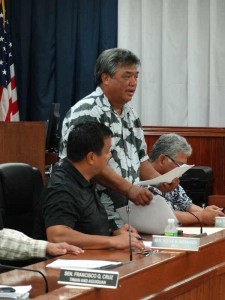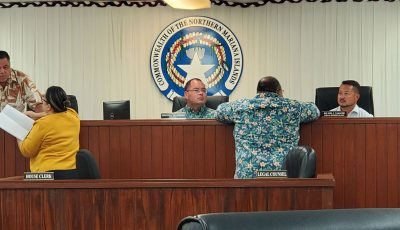House, Senate finally adopt budget bill
Compromise budget bill endorses salary raises, tourism cut, expenditure authority to school principals
The year fiscal 2016 budget talks finally was resolved in a compromise bill yesterday that endorses salary raises, tourism program cuts, and gives expenditure authority to public school principals, in budget provisions that were first proposed by senators and eventually backed by House representatives.
That bill—H.B. 19-86, HD6, SSI, CCSI—will now be entertained by both the Senate and the House of Representatives today when they meet in the afternoon.

Budget conference chairs Rep. Antonio Sablan (Ind-Saipan) and Rep. Jude Hofschneider (R-Tinian) look over budget documents during a break in yesterday’s session. (Dennis B. Chan)
At 4:42 pm yesterday, the bicameral committee tasked with resolving differences between two versions of next year’s budget adjourned their session, ending weeks of prolonged negotiations and delays as Gov. Eloy S. Inos and department heads braced for a government shutdown with no budget resolution in sight.
The deadline for the Legislature to submit a budget for Inos’ signature is on Sep. 30.
House and Senate conferees formally adopted a budget bill yesterday. And also adopted a committee report that detailed their compromise over some of the bill’s most contested provisions.
When they first met nearly three weeks ago on Sep. 3, conferees had three primary issues: the use of “outside resources” or Inos-directed earmarks for the Marianas Visitors Authority; concerns from the Public School System over ripping away expenditure authority from the education commissioner and giving it to school principals; and salary increases for law enforcement and department heads.
In some form, these Senate provisions remained in the budget settled upon yesterday.
The Senate locked on MVA earmarks to fund program money shortfalls for money first appropriated to fund their provisions. They had moved the local hospital’s utility subsidy, at first, but the House got this off the table.
The lawmakers agreed to modify MVA’s budget to fund $1,802,403 for Department of Public Work streetlights; $200,000 for an x-ray machine at the airport; $225,000 for a container and loose cargo x-ray machine at the seaport; $75,000 for a handheld x-ray scanner at the seaport; and $200,00 for the Mayor of Saipan for cleanup and beautification projects.
‘Decentralized’ spending
The Senate wanted to task the Public School System for reports about unkempt campuses on Tinian and telling students to bring their own toilet tissues. They got that, in some form, too, in a bill that gives the expenditure authority to the education commissioner, but “provided that the expenditure authority for the operations of each public school” would be the school principal.
PSS has expressed its concerns about this power over “operations,” saying that this provision creates a new system that would “decentralize” spending and give it to principals.
“Does that mean that each school will now pay for their own utilities? Negotiatie for a printer? Buy textbooks for their students that may differ from another sister school?” writes Board of Education chair Herman Guerrero and Education Commissioner Dr. Rita Sablan in a joint letter to the House in late August.
As operational expenses are only budgeted a few million dollars, the education leaders said these expenses “must be fluid in order to deal with emergencies” and shortage of funds that occur system-wide at different schools.
“The bottom line is that money must be fluid because an emergency on Rota is not Rota’s emergency; it is the CNMI Public School System’s emergency,” the education leaders wrote last month.
Salary increases
The conferees agreed to the following salary increases:
-$62,000 for the special assistant for Office of Management and Budget from annual salary of $54,000
-5-percent increase for all law enforcement officers
-$45,000 for Rota and Tinian department heads from a salary of $36,000
-$45,000 for Rota and Tinian deputy commissioners for Fire



























